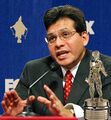The Lindys
“The right to swing my fist ends where the very narrowest possible reading of our anti-torture laws begin.”
The Geneva Academy Awards, more commonly known as The Lindys, are the most prominent awards for International Human Rights Abuses. The awards are granted yearly by the Geneva Academy of International Affairs, a multi-national honorary organization of leaders, military personal, intelligence agents, policy-makers and executive producers.
Nominees are announced each year on the 12th of September, and members of the academy vote for the winners in a variety of categories, including Most Innovative Method of Torture, Best Picture, Best Writing in a Legal Policy, Best Supporting Administrator and Best Song and Dance.
History[edit]
The Lindys were originally conceived as an effort to bring a much-needed touch of class to the industry of torture as a whole. The awards were intended to shine a light on the quality innovations and techniques of a much besmirched industry, as is shown by this quote from the Academy's President, Joe McCarthy Jr., who spoke at the first Lindy Awards:
- Our occupation has received a tarnished reputation as of late. People say that torture is inhumane and that it is ineffective, but they just need to see the good work that is going on to protect our country. Some people think that attaching electrodes to a prisoner's genitals is against what America's Founders stood for, but I believe that if Benjamin Franklin were alive today, he would gladly attach his kite-string and key to the testicles of a suspected Communist, go out into that thunder storm, and proudly fly his kite for freedom. And that's why this year's Technical Award goes posthumously to Mr. Franklin, for the discovery of electricity, which is so valuable to all of our work.
Since its inception the award's categories have been open to amendment each year, and in the course of the Lindys' history, several categories, including Best Anti-Communist Technique, have been phased out for more relevant awards such as Most Novel Desecration of a Holy Text.
Controversy[edit]
The initial introduction of the award was not without controversy, as many felt it stepped on the toes of other pre-existing awards. For instance, the United Nations Human Rights Committee had long given recognition to a wide variety of human rights abuse performances, and some saw the Lindys as trying to compete with the Unnys.
Currently, the Lindys are the golden standard for international abuse, whereas the Unnys now focus more on abuses that occur within one nation's borders. The Lindys arguably overtook the Unnys in this area because of their academy-style voting, which was seen as more legitimate than the somewhat-less-credible voting rules of the United Nations awards.
The awards also drew fire from the Norwegian Nobel Commission, which awards the Nobel Peace Prize. While many see the two awards as complimentary — the Lindys are traditionally given out the day before the Nobel Award Show — Nobel Commissioner Gustav Gustafson begs to differ.
- People think of us as the highs and them as the lows, like the Oscars and the Razzies[1], but what those people don't understand is how the selection of the Nobel prize works. Some years there just aren't any good peaceniks who've come out. So rather than disappoint the fans by not giving out the award or by giving it to a slightly less-than-worthy performance, we will hand out the award ironically. We've given awards to Henry Kissinger and Yasser Arafat that way. The viewers knew how we meant it, and it gave some excitement to the show. Now with the Lindys preceding us, it is very difficult to give out the award ironically anymore.
Nomination[edit]
Because torture is such a collaborative effort between many levels of authority, the academy works very hard to identify the proper nominees for a given act of detainee abuse. Often a good idea implemented on the ground will come from much higher up, while conversely, ideas handed down officially may have life truly breathed into them by the artists working on the details. Academy President McCarthy explains it this way:
- We try very hard to give credit where credit is due, whether it is at the high end or the low end. People think that Secretaries and Undersecretaries are just like Executive Producers — that they write the checks, but don't really do the creative work. Sometimes that isn't the whole story, so we try to follow ideas as far up the chain of command as they go.
- But we also have to keep in mind that it isn't just about bringing in the big names. Sure, we get better ratings for the awards broadcast if we've got a Rumsfeld or a Gonzales on the nominee list, but this is about honoring those who truly deserve it.
In order to maintain this rigor, the process of gathering the information for the nominee selection is kept secret, often performed in unrecognized bases in foreign countries using specially trained information-gathering teams.
Awards Night[edit]
In recent years the Awards Ceremony has become a star-studded event complete with a red carpet and prominent presenters and attendees. Popular comedians such as Chris Rock are called upon to serve as the Master of Ceremonies, and the broadcast is carried in prime-time by one of the four major networks.
The current administration has been good for hometeam moral at the Lindys, and the frequency with which American nominees have won has raised the award's profile significantly by drawing in A-List government officials, as is shown in these photos from recent years (click on an image to enlarge):
|
|




